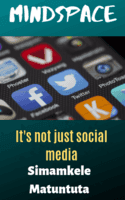If, ten years ago, you had told me social media would become something so incredibly big that it literally changed people’s lives, I would have hesitated to believe you. Why the hesitation? Because although there was an indication of the rise of social media at the time, nothing prepared any of us for the impact this communication tool has on our lives.
In 1991, the world wide web A.K.A the internet was launched, and we saw serious innovations that followed, from Instant Messenger to Google, emails and such. But then the birth of social media platforms like Myspace, YouTube, LinkedIn, Facebook, Tumblr, Pinterest, Twitter, Snapchat, WhatsApp, and Instagram revolutionised the social media industry.
Social media is now an integral part of our daily lives, so much that it’s kind of hard to imagine a life without it. Speak to a post-millennial about life before social media, and you’ll find how mystified they become just at the thought of a world without social media.
The majority of people all over the world (myself included), wake up and the first point of contact they make is on social media. Because of that, I thought it is worth briefly exploring how we currently use social media, both the negatives and the positives.
Let’s talk about the dark side to it that we ought to be aware and mindful of. Social media opens up an opportunity for bigotry to triumph. Many people use the platforms to spew their hate, racism, prejudice, sexism, homophobia, transphobia, xenophobia, and everything of this nature you can imagine.
Cyberbullies use its power of anonymity to exercise their violence while hiding behind unnamed profiles, causing harm to others in the process.
The majority of the bigots and the bullies have gone unpunished, and some, only a very select few, have seen the face of justice.
Moreover, social media has been linked to poor sleep quality, body image and self-esteem issues. There are also numerous studies which have pointed out the addictive qualities and the adverse effects of social media to overall mental health. One more scroll turns into two more – until it’s 3am and it’s 2 hours before you have to wake up and start a new day.
Also, the pictures of celebrities and other regular folk living what appear to be perfect lives not only cause us FOMO (fear of missing out) but major anxiety issues, as our own lives don’t seem as significant or fabulous in comparison to theirs. We start to question everything about ourselves and wonder where we are going wrong. We start doing 30 squats and eating avocado for breakfast, lunch and dinner in hopes of acquiring the so called “summer body”, and get pretty disappointed when it doesn’t take shape the following day.
We become extremely self-conscious, search for instant gratification and affirmation (how many likes!), and perhaps fall for the trap of living beyond our means, just for that one Instagram post.
With that said, social media also carries with it the good side. It is a tool that provides us with access to information, and has enabled much that we now take for granted.
It has become a significant tool in the fight for democracy. People can share their views about politics and policies, which in turn can elicit response and change from the government.
It has the power to hold the government accountable for its actions or inactions through the use of hashtags. An example of this would be the #feesmustfall movement, where students were fighting for free education. This hashtag ultimately gained international traction and action and resulted in South Africans all over the globe (and a number of citizens from other countries) joining and supporting the fight through social media.
People and brands use social media to organise activities, events, and showcases. Activists and Non-Profit Organizations use social media to create awareness of multiple causes.
Businesses are benefiting from its power because of its rapidly increasing user base. And because of this, the demand for people who understand social media is also increasing. This is how a new career was born, and now we’re witnessing a surge of social media professionals. The most recent example is the influencer marketing model.
Influencer marketing makes use of people who have a large following (called influencers) to market their products and or create brand awareness. Their role is, as the term suggests, to influence a brand’s target audience to buy into its products. The new age “word-of-mouth”.
A number of regular folk have found jobs, even career breakthroughs via social media. I, myself have found many job opportunities through social media.
Furthermore, companies themselves have advanced their search for potential employees to include social media. They look for potential through social media; this is why HR practitioners encourage job seekers to be present and active on social media.
Recently, local government departments announced that they will be screening social media posts of candidates who are looking for employment in the public service.
People have found their loved ones through social media; some have found love, and marriage. Others have travelled the world through and because of social media. We also continuously see a trend of Ubuntu, where people go out of their way to help those in need, with calls going out on various social media platforms.
So, in essence, it is more than ‘social media’, and can be hugely rewarding. But one has to use it with an open mind and be fully aware of its negatives as well as its positives.
Tell us: what are your feelings about social media?


